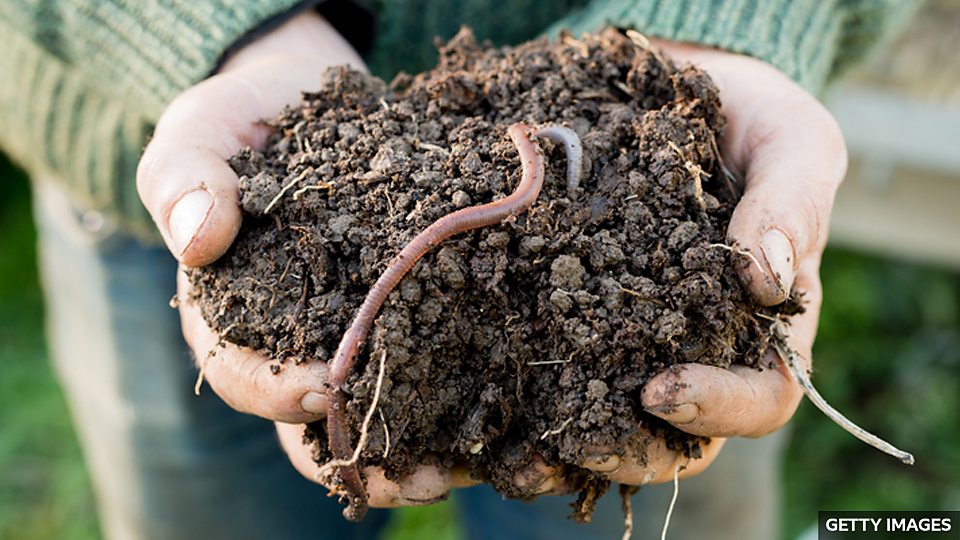小小蠕虫默默无闻、粘粘乎乎,还扭来扭去,但它们为什么被称为 “大英雄”?作为蠕虫的一种,蚯蚓可通过松动和混合土壤来助农耕者一臂之力;人们还发现蜡虫的唾液中含有可分解塑料的酶;血虫的口部为建筑师带来了设计灵感。原来小虫子真能帮大忙!
词汇:worms 蠕虫
Are worms the heroes we didn't know we needed? Silent, slimy and wriggling, you might think that worms are good for nothing except bait on the end of a fishing rod. However, there is more to the humble worm than meets the eye.
The British naturalist Charles Darwin said that no other animal has "played such an important part in the history of the world as these lowly organised creatures". They have lived on Earth for 600 million years and have even survived five mass extinctions. So, what do worms do that is so great?
Earthworms literally move the earth, and this is why farmers love them. As they travel, they aerate the soil by loosening, mixing and oxygenating it, which increases the ground's capacity to hold and drain water. They are effectively a small but very efficient plough. But it's not just earthworms that deserve praise.
In 2022, a group of scientists at the Margarita Salas Center for Biological Research isolated enzymes found in wax worm saliva which are plastic-eating. These can break down polyethylene, a very common plastic that normally degrades over many years. It's hoped that by producing these enzymes on an industry-level scale, we will have a more environmentally friendly way to reduce plastic pollution.
And worms are even inspiring the building industry. Bloodworms are small sea creatures which burrow into the mud of the ocean floor. Scientists at the University of California, Santa Barbara have been studying their jaws, which are made up of 10% copper proteins and are so strong that they last the worm's entire five-year lifespan. Because of this research, engineers may start using the jaws as inspiration for the design and manufacture of materials like concrete.
So, next time you see a worm, show it a little respect. They really are changing the world!
词汇表
worm 蠕虫
slimy 黏糊糊的
wriggling 蠕动着的,扭动着的
bait (鱼)饵
humble 不起眼的,普通的
naturalist 博物学家
lowly 低等的
creature 动物,生物
mass extinction (生物)聚群绝灭
earthworm 蚯蚓
aerate 使(土壤)透气
soil 土壤
loosen 松动
oxygenate 给…供氧
plough 犁
enzyme 酶
wax worm 蜡虫
saliva 唾液
plastic-eating 分解塑料的
bloodworm 血虫
burrow 钻,打洞
jaws 口部
测验与练习
1. 阅读课文并回答问题。
1. How long have worms existed on Earth?
2. How do earthworms help farmers?
3. True or False? Wax worms eat plastic.
4. Why might enzymes help to reduce plastic pollution?
5. What makes the jaws of the bloodworm so special?
2. 选择意思恰当的单词或词组来完成下列句子。
1. I hate touching animals like slugs and frogs – they're so _______!
lowly slimy humble plastic-eating
2. They are trying to remove the rats – they have _______ into the riverbank.
loosened aerated burrowed oxygenated
3. We often use worms as _______ when we go fishing.
bait enzyme jaws extinction
4. Only use this in emergencies. It's a blanket that's _______ to fire.
efficient resistant wriggling inspiring
5. This new plant isn't growing. I think it should be in sand, not _______.
saliva soil naturalist creature
答案
1. 阅读课文并回答问题。
1. How long have worms existed on Earth?
They have lived on Earth for 600 million years.
2. How do earthworms help farmers?
As they travel, they aerate the soil by loosening, mixing and oxygenating it, which increases the ground's capacity to hold and drain water.
3. True or False? Wax worms eat plastic.
False. Enzymes found in wax worm saliva are plastic-eating.
4. Why might enzymes help to reduce plastic pollution?
Because the enzymes can break down polyethylene, a very common plastic that normally degrades over many years.
5. What makes the jaws of the bloodworm so special?
They are made up of 10% copper proteins and are so resistant that they last the worm's entire five-year lifespan.
2. 选择意思恰当的单词或词组来完成下列句子。
1. I hate touching animals like slugs and frogs – they're so slimy!
2. They are trying to remove the rats – they have burrowed into the riverbank.
3. We often use worms as bait when we go fishing.
4. Only use this in emergencies. It's a blanket that's resistant to fire.
5. This new plant isn't growing. I think it should be in sand, not soil.


 3342次下载
点击下载
3342次下载
点击下载
 2621次下载 点击下载
2621次下载 点击下载
 4734次下载 点击下载
4734次下载 点击下载
 1854次下载 点击下载
1854次下载 点击下载
 1391次下载 点击下载
1391次下载 点击下载
 1391次下载 点击下载
1391次下载 点击下载











